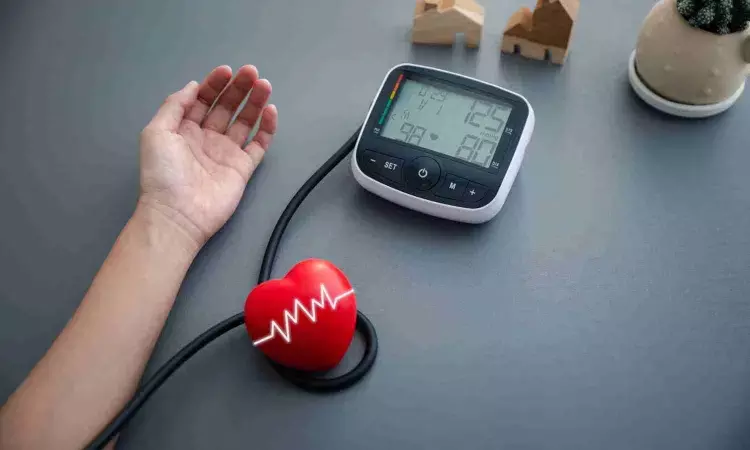- Home
- Medical news & Guidelines
- Anesthesiology
- Cardiology and CTVS
- Critical Care
- Dentistry
- Dermatology
- Diabetes and Endocrinology
- ENT
- Gastroenterology
- Medicine
- Nephrology
- Neurology
- Obstretics-Gynaecology
- Oncology
- Ophthalmology
- Orthopaedics
- Pediatrics-Neonatology
- Psychiatry
- Pulmonology
- Radiology
- Surgery
- Urology
- Laboratory Medicine
- Diet
- Nursing
- Paramedical
- Physiotherapy
- Health news
- Fact Check
- Bone Health Fact Check
- Brain Health Fact Check
- Cancer Related Fact Check
- Child Care Fact Check
- Dental and oral health fact check
- Diabetes and metabolic health fact check
- Diet and Nutrition Fact Check
- Eye and ENT Care Fact Check
- Fitness fact check
- Gut health fact check
- Heart health fact check
- Kidney health fact check
- Medical education fact check
- Men's health fact check
- Respiratory fact check
- Skin and hair care fact check
- Vaccine and Immunization fact check
- Women's health fact check
- AYUSH
- State News
- Andaman and Nicobar Islands
- Andhra Pradesh
- Arunachal Pradesh
- Assam
- Bihar
- Chandigarh
- Chattisgarh
- Dadra and Nagar Haveli
- Daman and Diu
- Delhi
- Goa
- Gujarat
- Haryana
- Himachal Pradesh
- Jammu & Kashmir
- Jharkhand
- Karnataka
- Kerala
- Ladakh
- Lakshadweep
- Madhya Pradesh
- Maharashtra
- Manipur
- Meghalaya
- Mizoram
- Nagaland
- Odisha
- Puducherry
- Punjab
- Rajasthan
- Sikkim
- Tamil Nadu
- Telangana
- Tripura
- Uttar Pradesh
- Uttrakhand
- West Bengal
- Medical Education
- Industry
Bariatric surgery most effective for long-term BP control among obese people

Bariatric surgery is more effective in controlling hypertension rates, or high blood pressure, in people with obesity and uncontrolled high blood pressure compared to blood pressure medication alone, according to a study published today in the Journal of the American College of Cardiology. People who underwent bariatric surgery had lower BMI and were on fewer medications after five years while maintaining normal blood pressure levels than those who only used antihypertensive medications.
According to the CDC, the U.S. obesity and hypertension rates in adults are 41.9% and 45.4%, respectively. Obesity is a known risk factor for cardiovascular disease and a major contributor to high blood pressure, which can make a person more susceptible to heart attack, stroke and heart failure, among other risks.
“In clinical practice, obesity is an overlooked condition. As a consequence, there is a frequent failure in approaching obesity as a crucial step for mitigating the risk of important cardiovascular risk factors including hypertension,” said Carlos Aurelio Schiavon, MD, FACS, lead author of the study and a surgeon specializing in bariatric surgery at Heart Hospital (hcor) and BP Hospital in Sao Paulo.
Researchers in this study looked at the impact of treating obesity to lower high blood pressure. While there are new medications to treat obesity, long-term adherence to medication can be challenging. This study looks at bariatric surgery as a better long-term solution to control obesity and, as a result, high blood pressure.
The GATEWAY trial included 100 people (76% of which were female) who had a body mass index (BMI) of around 36.9Kg/m2. All participants had hypertension and were using at least two medications. People with previous cardiovascular events and poorly controlled Type 2 diabetes were excluded. Subjects were assigned to either Roux-en-Y gastric bypass with medical therapy or medial therapy alone and the primary outcome was reduction of at least 30% antihypertensive medications while maintaining blood pressure levels less than 140/90 mmHg at five years.
At five years, BMI was 28.01 Kg/m2 for those who received bariatric surgery and 36.40 Kg/m2 for those on medical therapy alone. People who had bariatric surgery had an 80.7% reduction in the number of medications they were taking compared to a 13.7% reduction in those only using medical therapy. Hypertension remission, defined as controlled blood pressure without medications, was 46.9% in those who underwent bariatric surgery compared to 2.4% in those on medical therapy alone.
“Our results underscore the importance of approaching obesity in reducing hypertension rates,” Schiavon said.
Limitations of the study include that it was a single-center, open-label study with a small sample size and there was loss of follow up in some patients.
In an accompanying editorial comment, Michael Hall, MD, MSc, professor and chair of the Department of Medicine at the University of Mississippi Medical Center, said the study provides important long-term data on the benefits of gastric bypass on weight loss and blood pressure control, but questions remain.
“Further studies assessing the threshold for bariatric surgery in people with obesity, optimal timing of bariatric surgery in obese people with cardiometabolic diseases, type of bariatric surgery and comparative studies of obesity pharmacotherapies and bariatric surgery are needed to clarify the optimal treatment pathways for this common and growing disease,” he said.
Reference:
Carlos A. Schiavon, Alexandre B. Cavalcanti, Juliana D. Oliveira, Rachel H.V. Machado, Eliana V. Santucci, Renato N. Santos, Julia S. Oliveira, Lucas P. Damiani, Débora Junqueira, Helio Halpern, Frederico de L.J. Monteiro, Patricia M. Noujaim, Ricardo V. Cohen, Marcio G. de Sousa, Luiz A. Bortolotto, Otavio Berwanger, Luciano F. Drager. Randomized Trial of Effect of Bariatric Surgery on Blood Pressure After 5 Years. Journal of the American College of Cardiology, 2024; 83 (6): 637 DOI: 10.1016/j.jacc.2023.11.032
Dr Kamal Kant Kohli-MBBS, DTCD- a chest specialist with more than 30 years of practice and a flair for writing clinical articles, Dr Kamal Kant Kohli joined Medical Dialogues as a Chief Editor of Medical News. Besides writing articles, as an editor, he proofreads and verifies all the medical content published on Medical Dialogues including those coming from journals, studies,medical conferences,guidelines etc. Email: drkohli@medicaldialogues.in. Contact no. 011-43720751


